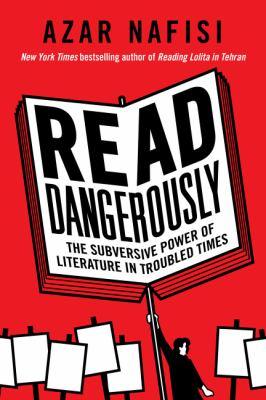
Read dangerously : the subversive power of literature in troubled times
Drawing on her experiences as a woman and voracious reader in the Islamic Republic of Iran, Azar Nafisi explores the most probing questions of our time, arming readers with a resistance reading list that includes Toni Morrison, Salman Rushdie, James Baldwin, and Margaret Atwood.
Available Copies by Location
| Location | |
|---|---|
| Victoria | Available |
Browse Related Items
- ISBN: 9780062947369
- Physical Description 223 pages ; 22 cm
- Edition First edition.
- Publisher [Place of publication not identified] : [publisher not identified], 2022.
Content descriptions
| Bibliography, etc. Note: | Includes bibliographical references. |
| Formatted Contents Note: | The first letter: Rushie, Plato, Bradbury -- The second letter: Hurston, Morrison -- The third letter: Grossman, Ackerman, Khoury -- The fourth letter: Atwood -- The fifth letter: Baldwin, Coates. |
Additional Information

Publishers Weekly Review
Read Dangerously : The Subversive Power of Literature in Troubled Times
Publishers Weekly
(c) Copyright PWxyz, LLC. All rights reserved
"We need the truth that fiction offers us," writes Nafisi (Reading Lolita in Tehran) in this stunning look at the power of reading. Written from November 2019 through June 2020 as a series of letters to her late father, Nafisi's reflections grapple with literature's ability to counter oppression--as she writes, "Fiction subverts the absolutist mindset by defending the right of every individual to exercise their independence of mind and of heart." Her close readings come in five sections: the first considers how Plato, Ray Bradbury, and Salman Rushdie all revealed the discomfort involved in seeking truth. Zora Neale Hurston and Toni Morrison, meanwhile, created powerful heroines who reclaimed their own stories, while empathy and complexity suffuse Nafisi's discussion of war and the Israeli-Palestinian conflict via the works of David Grossman, Elliot Ackerman, and Elias Khouri. Margaret Atwood's The Handmaid's Tale is invoked in a discussion about the roles that "ordinary, often decent, people play in bringing about a totalitarian state," and James Baldwin and Ta-Nehisi Coates offer lessons for coping with rage at racial injustice. Nafisi's prose is razor-sharp, and her analysis lands on a hopeful note: "I really believe that books might not save us from death, but they help us live." This excellent collection provokes and inspires at every turn. (Mar.)


